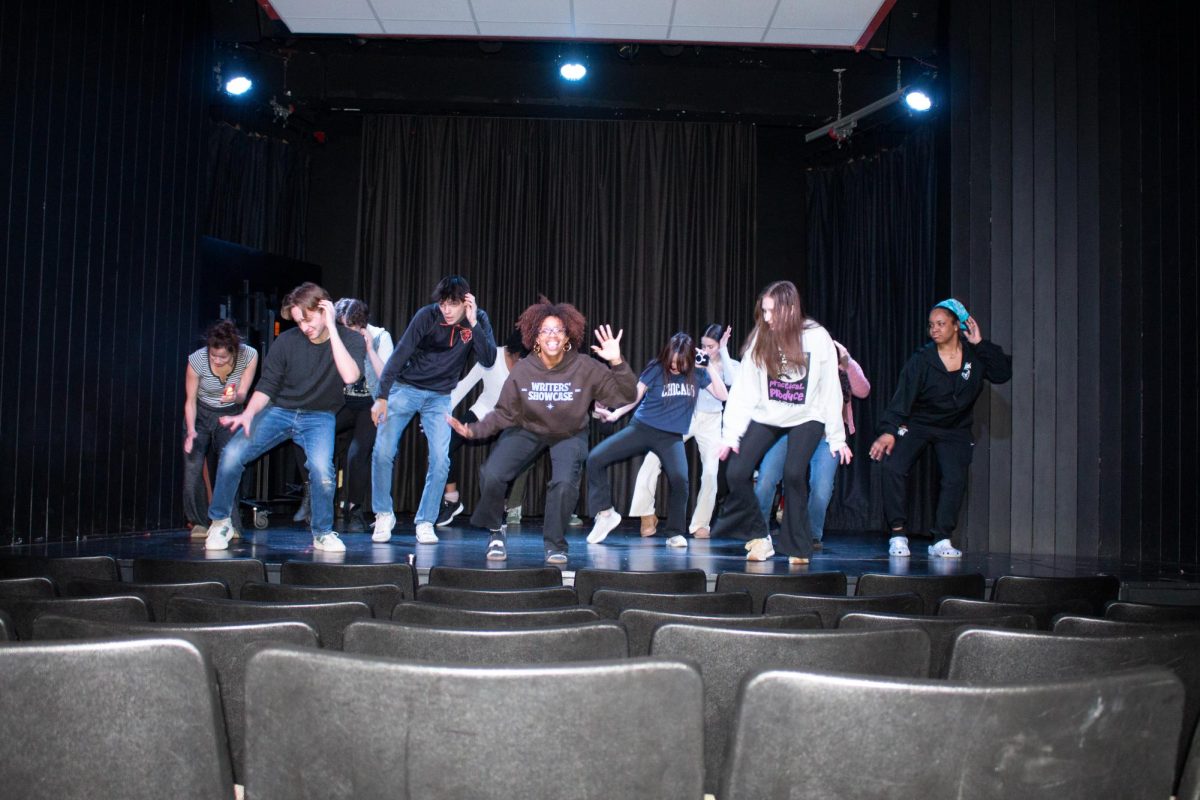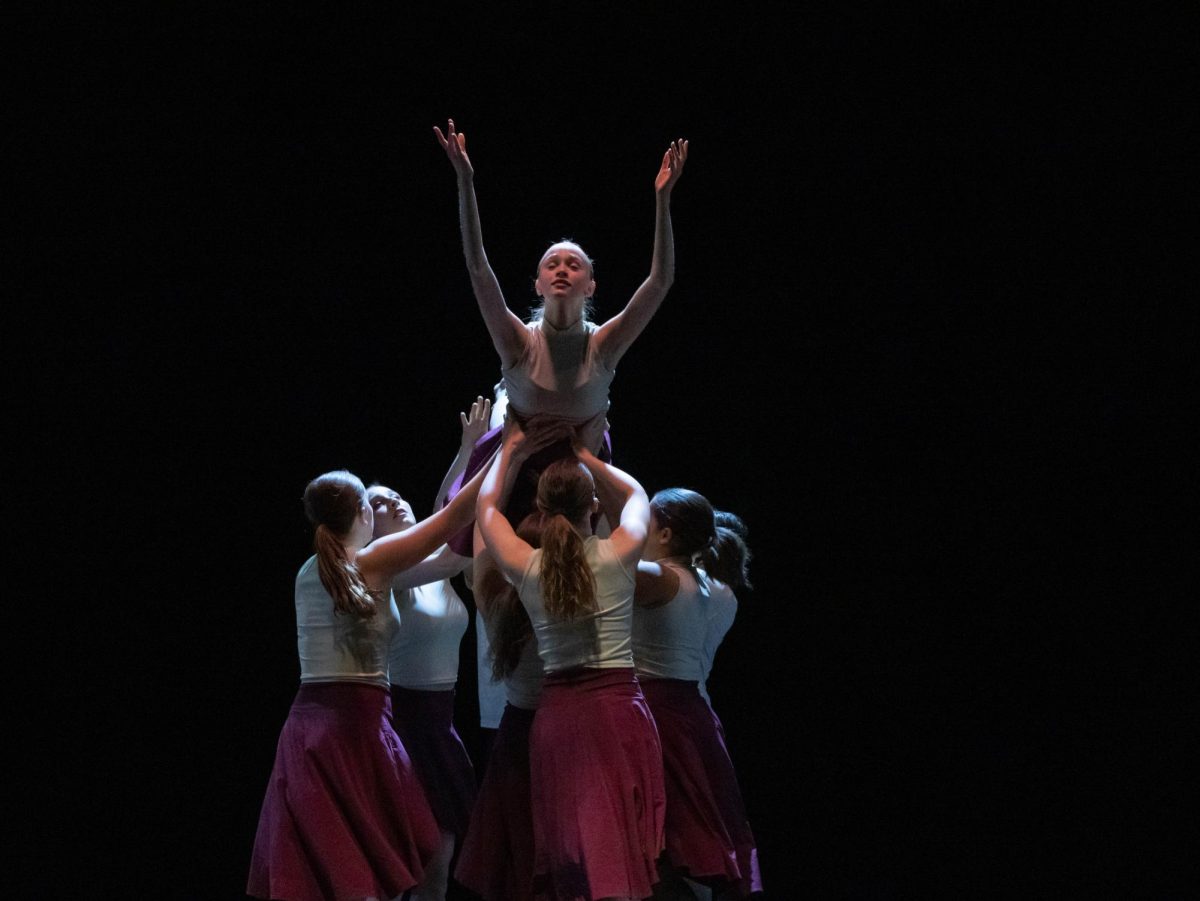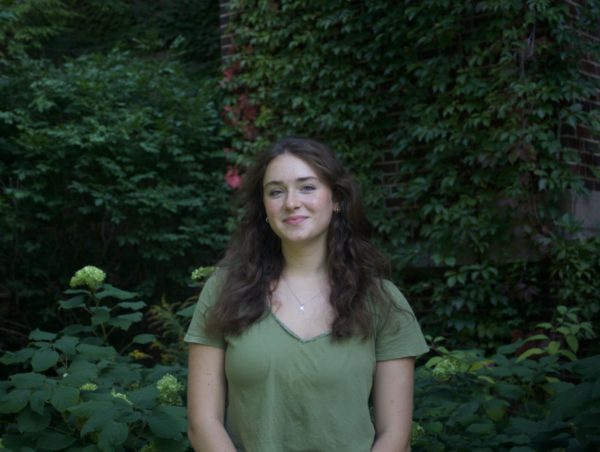On March 15 and 16, the ETHS Little Theater will hold a group of actors in black t-shirts and blue jeans, making up the annual skit production, Writer’s Showcase. Writer’s Showcase is a unique production at the high school, as it functions as a place for both writers and actors to come together to create short scenes that have audience members bursting out laughing and then a few moments later, tearfully focusing on the stage.
Writer’s does not just involve the theater department and the usual theater ensemble. For this show, they partner with the English department to gather writing from any student in the school that submits their work. One of this year’s directors, senior Foster Pratt walks through the types of submissions they consider.
“It can be an essay you wrote in the class, it could be a short story, it could be a whole novel you’ve written, it could be poems, or short play or sketch ideas you can literally have it be any concept of writing that you have,” Pratt says.
The sky’s the limit for what you can submit, which makes the show accessible for all aspiring writers at the school.
Students are able to hear about this opportunity through the Writer’s Showcase board of around 20 students that do presentations in English classes and also the posters hanging on bulletin boards around the school. Some English teachers have been known to offer extra credit to students that submit work.
Writer’s Showcase has been supervised by English teacher Katherine Buck for the past three years but has been a recurring show for decades at the high school. Buck, being the representative for the show in the English department, works all year long on the project.
“I work with every group of kids,” Buck says. “I’m the one who reaches out to the English department and then works with the Writer’s board with all the writing submissions, and then with the whole cast. I’m kind of just the link between everybody.”
Once these works of writing are submitted—this year, the show gathered around 200 pieces—they are brought again to the Writer’s board, where they then spend time from December to February reading through these countless pages. Working with Buck, they choose around 15 of their favorites that “[usually] they think will be easy to adapt, are good stories, or just meaningful writing,” Pratt explains.
Then from there, the selected pieces get handed off to the directors of the show so they can begin to adjust them for the stage.
The directors this year are seniors Foster Pratt, Lauren Guevara and The Evanstonian’s own opinion columnist, Malory Frouin. This trio of talented students have all had experience with Writer’s Showcase in their past years at ETHS, and so when stepping into the role of director, they knew the type of flexibility and open-mindedness that the show requires.
Pratt specifically tells about his reasoning for being in Writer’s, since last year he was in the musical Urinetown, which unfortunately overlaps with the time for Writer’s Showcase. “This year, I wanted to stay involved and do as much theater as I could. I loved directing YAMO, so much that I was like, ‘I’m going to apply to direct Writers as well,’” Pratt explains.
Guevara was a part of the ensemble her sophomore and junior years, as the show was canceled her freshman year due to COVID-19. Having the experience of being on stage is much different from the director’s stand-point. “With this [role] you see the full process of the pieces,” Guevara says. “So you’re taking them from just novel style stories to then put on stage directions, put in some of the dialogue to be more applicable to the stage, that type of thing, and then actually directing it.”
This job of transforming non-script writing into a scene for the stage is a tedious one.
“You have to look at it through like two minds: what the author would want and what you want,” Guevara says. The authors of these pieces have their own ideas of the story they are telling when they create their piece, but sometimes with the more abstract works, it is hard for the directors and actors to extract what the specific meaning was, which could alter how it is performed on stage.
“I hope that [students] know when they submit it that we are going to take liberty with whatever they submit, and that we can cut and change points,” Pratt says. “We try to not change too much, but also get to their message as efficiently as possible. That means sometimes sacrificing lines or jokes that they’ve written.”
That balance between honoring the original author’s intention with their submission and creating a scene that works on stage is a delicate one to strike.
“There’s always a little bit of holding your breath on show day,” Buck says. “I’ve never had a student not like how their piece was performed, but you want to do justice to it and make sure that you’re really honoring and celebrating that student’s work.”
Pratt had an interaction with an author after his sophomore year show. He and former ETHS student Matias Kruse did a scene with ridiculous Scottish accents that he describes as his favorite scene he has ever done in ETHS theater. “The scene Matias and I did was like a 15-page thing, turned into a one-minute scene. It was so serious, but we were just doing these terrible accents. The [author] came up to us afterwards and told us, ‘That is not at all what I meant, but I loved it.’”
That is something that the performing group tries to keep in mind: although there is a joint effort between the directors and the actors, there is no communication between them and the author.
“I think the challenge, and the excitement of it, is being trusted with students’ writing,” Buck says. “We asked them to submit these pieces and then we don’t necessarily collaborate, we just perform their piece how it was interpreted.”
The turnaround for this show is a quick one, and this is a challenging aspect for the ensemble of the show, but knowing this, those in charge have a few strategies to combat this setback.
“We cast people in mind, who we either know, or we can see from their audition, they can handle memorizing fast, taking direction well and are creative enough to have their own ideas and take it in their own direction,” Pratt tells.
And since this group rehearses every day in this three-week span, and each of the scenes are approximately five minutes, the work-load for each of the actors isn’t an immense amount. Pratt additionally adds that “everyone has a big scene that they can handle, so we don’t overwhelm anyone and there’s not one person who’s dominating all the leads. We try to evenly distribute casting as much as possible.” Buck adds how “it’s also fun having students who are in the theater classes, and that have that training that they can apply in this.”
This organization style makes it so the rehearsals are enjoyable, versus stressed and rushed.
And these rehearsals are agreed among the cast to be the best parts of the show, with ideas being thrown around by each and every person. “I just love it. I haven’t done anything else quite like this. there’s no power dynamic. If someone has a good idea, that idea is going to be in the show,” Pratt explains.
“Tt’s just awesome to see everything come together, because sometimes during like regular plays you can have some collaboration from directors and actors, but this is a complete collaboration. It’s really cool,” Guevara says.
Being a director in this short time period makes it difficult to imagine that you are getting the best possible version of a scene. “Can we ever be truly satisfied with what we could achieve in three weeks? And the answer is, yes,” Pratt says. “But you have to get over that mental hurdle to get there.”
Guevara brings up another hurdle: the lack of resources the show has.
“There’s little to no props and there’s no costumes. So that can be super hard, and it’s also just such a tiny space. Everyone writes these huge pieces that require set changes and tons of props and all these different things,” Guevara explains. “We’re gonna wear blue jeans and a black shirt so we can’t really do much with that…but it’s fun to see how the directors and the ensemble can collaborate to make these big pieces come to life.”
This year, the show has no freshman and only one sophomore. The preservation of the show has been on Pratt’s mind: “I don’t want people to forget the writer’s showcases here. It is the most welcoming theater experience. If you aren’t sure about what to do in theater, do Writer’s Showcase first. You get to meet a lot of people in theater and get to know what it means to be on stage.”
Buck adds how “we’d love to see it grow..and I’m excited to see where it goes in the future.”
Writer’s has always been a very student-run activity, more than any other theater production at ETHS. Pratt says when putting the show together, “there’s no structure, there’s no guidance, we’re still all figuring out how to put the show together in three weeks. With YAMO, it’s been done 66 times. There’s a formula; there’s an algorithm to get a show done. But with writers it’s like, yeah, we have to do all this stuff. But when? how? What do we do?”
This freedom with how the show is put on is something that Guevara thinks makes it “really by and for the students.”
Those involved with Writer’s Showcase always have a strong connection to the production and remember their time doing the show as one of the more special things they have done during their time at ETHS.
“A lot of the people in the past that were in charge of it, created a really good and nurturing environment for people. This is a show that people do, as the last thing that year, or for their whole high school career. But also for some people this is their first time doing anything,” Guevara tells. “It’s a huge range of experience, and it’s really cool to see how people who’ve been doing it for years and people who are doing it for the first time find their space.”








